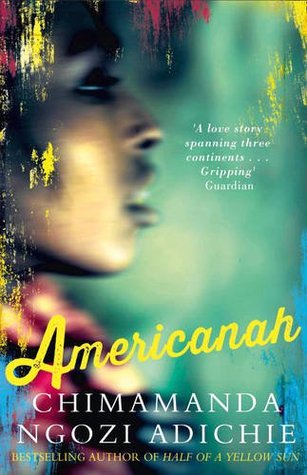 Americanah - 4.5/5
Americanah - 4.5/5I recently completed the final book in my summer reading list (see autumn TBR post for upcoming autumn list of books to be read). This book took me much longer than I expected to read, as I found myself slowing down to devour every single detail Adichie had put into the pages. I had never before read anything by this author, and to my memory nothing by a Nigerian author at all and I will certainly be back to read some of her others - Purple Hibiscus and Half of a Yellow Sun are currently sitting on my living room bookshelf. Some of the themes covered in the novel were those I had seen in other books and films I have encountered, but they felt born again and fresh.
Firstly, the blurb for those of you not familiar with the story:
As teenagers in a Lagos secondary school, Ifemelu and Obinze fall in love. Their Nigeria is under military dictatorship, and people are leaving the country if they can. Ifemelu—beautiful, self-assured—departs for America to study. She suffers defeats and triumphs, finds and loses relationships and friendships, all the while feeling the weight of something she never thought of back home: race. Obinze—the quiet, thoughtful son of a professor—had hoped to join her, but post-9/11 America will not let him in, and he plunges into a dangerous, undocumented life in London.
Years later, Obinze is a wealthy man in a newly democratic Nigeria, while Ifemelu has achieved success as a writer of an eye-opening blog about race in America. But when Ifemelu returns to Nigeria, and she and Obinze reignite their shared passion—for their homeland and for each other—they will face the toughest decisions of their lives.
Ifemelu and Obinze were extremely well-rounded characters, very raw and very honest - which made them very believable. What I liked most about Ifem's character (ironically) is that she was not always likeable. The majority of the novel is focused on Ifemelu's experiences of a life in America and the return to her homeland in Nigeria. I had never really considered the difference between 'non-American black' and 'black American' before, and Ifemelu (and by extension, Adichie) explores this during her time in America.
I watched an interview with Chimamanda Ngozi Adichie on Youtube, on International Author's Stage in which she explains the difference between an African American (someone who may have been forced to America by slavery) and American African (someone who comes more willingly). An interesting point of Ifemelu and Obinze's stories is that they are not forced from their country by war or famine. The aren't slaves forced to come to another country and leave all they have behind. Poverty isn't forcing them to leave Nigeria, in fact Obinze comes from a solidly middle-class family, while Ifemelu comes from a slightly poorer (but not desolate) situation. Ifemelu questions why when immigrants arrive on American shores with coloured skin, is it immediately assumed that they are fleeing warfare, when maybe all they want is a different life.
'Americanah', the term given to Nigerian people who return after a spell in America, does a great job of placing Ifemelu when she herself feels so displaced. She never feels American, and tries to shake the American accent she adopts. Yet, when she returns to Nigeria she is regularly called 'Americanah' and slips into subliminal American-isms. During her time in America, Ifemelu puts weight on, further losing her Nigerian identity and becoming more American. The author explores the themes of foreignness, growing and changing, returning home and, of course, race. A lot of these themes are very far removed from my everyday, and this made them fascinating to absorb. I enjoyed the paradox of race in America and Nigeria. "Dear Non-American Black, when you make the choice to come to America, you become black. Stop arguing. Stop saying I'm Jamaican or I'm Ghanaian. America doesn't care". You're only black in America, the author teaches us. There is no colour in Nigeria.
 Obinze was a much more likeable character than Ifemelu, and as a reader I felt myself rooting for him all the time when he rarely achieved his dreams. He had a life-long obsession with America, only reading American books and investing himself in American culture. He did not make it to America, however, and spent some time in England as an illegal immigrant before being deported. His marriage to Kosi was very far removed from the loving and passionate relationship he experienced with Ifemelu, and this makes you feel for him - such a passionate and loving personality drowning in mediocre.
Obinze was a much more likeable character than Ifemelu, and as a reader I felt myself rooting for him all the time when he rarely achieved his dreams. He had a life-long obsession with America, only reading American books and investing himself in American culture. He did not make it to America, however, and spent some time in England as an illegal immigrant before being deported. His marriage to Kosi was very far removed from the loving and passionate relationship he experienced with Ifemelu, and this makes you feel for him - such a passionate and loving personality drowning in mediocre.An exceptional read, best I've had in a long time.